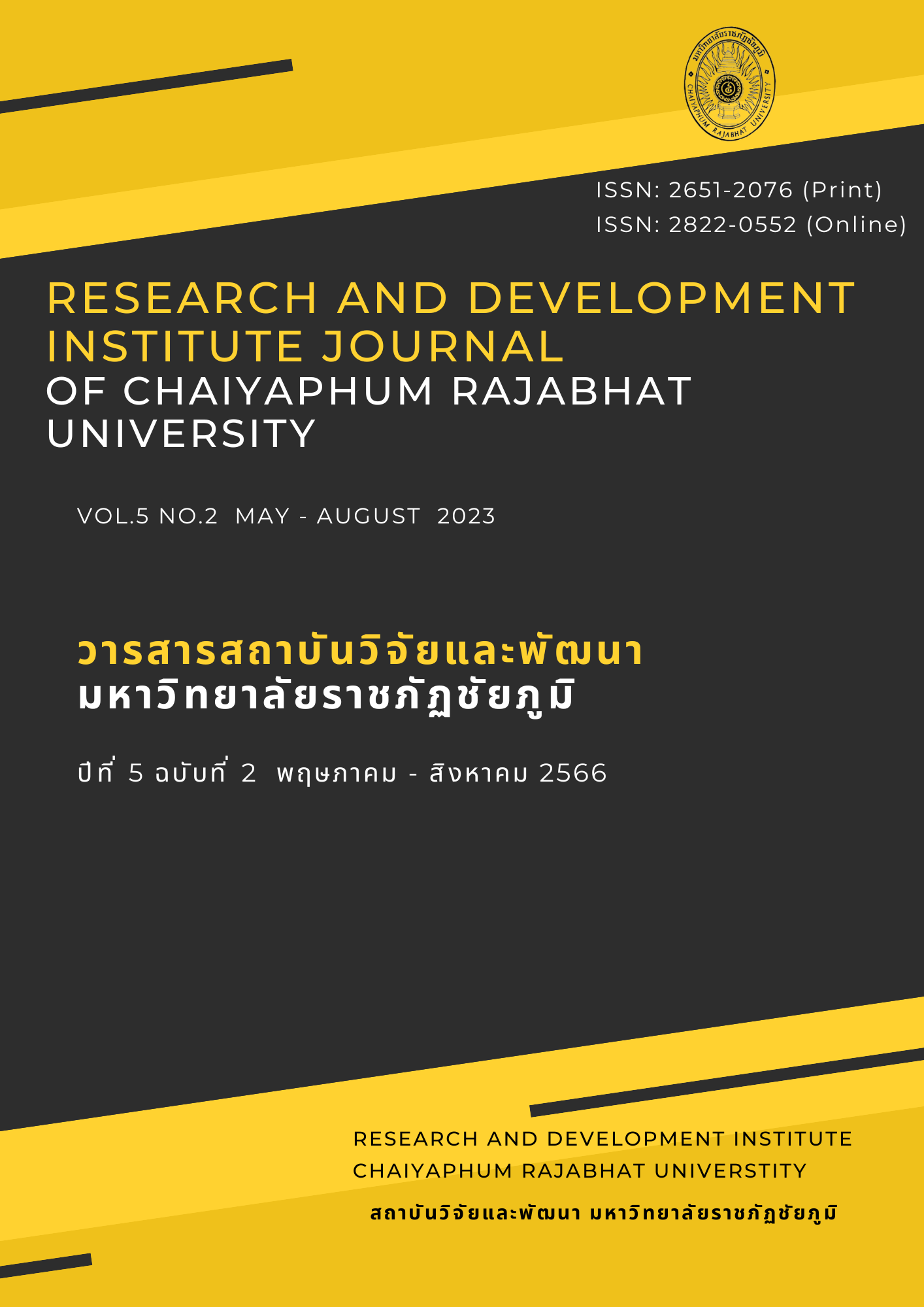The Development of Learning Activity Package Based on 7E’s Inquiry Cycle on Solution Set to Promote the Learning Achievement for Grade 10 Students
Main Article Content
Abstract
The purposes of this study were 1) to develop a learning activity package based on 7E’s Inquiry Cycle on the topic of solution for grade 10 students with an efficiency criterion of 80/80 and 2) to compare the learning achievement of grade 10 students. The participants were 43 tenth - grade students. The samples were selected by Cluster Sampling Techniques. The instruments used in this study were 1) the learning activity package based on 7E Inquiry Cycle on the topic of solution and 2) the learning achievement on the topic of solution. The data were analyzed using percentage, mean, standard deviation (S.D.) and t-test (dependent). The results of this study were as follows.
1) The Learning Activity Package based on 7E’s Inquiry Cycle on the topic of Solution was considered appropriate at a high level (mean= 4.50, S.D. = 0.56), the efficiency criterion (E1/E2) was 81.99/80.09 which met the 80/80 standard criterion.
2) After the Learning Activity Package was used in class, the results showed that students had higher learning achievements at 0.05 statistical significance level.
Article Details

This work is licensed under a Creative Commons Attribution-NonCommercial-NoDerivatives 4.0 International License.
Permission to use text, content, images, etc. of publication. Any user to read, download, copy, distribute, print, search, or link to the full texts of articles, crawl them for indexing, pass them as data to software, or use them for any other lawful purpose. But do not use it for commercial use or with the intent to benefit any business. Published under a Creative Commons Attribution-NonCommercial-NoDerivatives 4.0 International License.

This work is licensed under a Creative Commons Attribution-NonCommercial-NoDerivatives 4.0 International License
References
จรวย แม่นธนู. (2564). การพัฒนาชุดกิจกรรมการเรียนรู้กลุ่มสาระการเรียนรู้วิทยาศาสตร์เรื่องแรงและการเคลื่อนที่สำหรับนักเรียนชั้นมัธยมศึกษาปีที่ 3 ด้วยรูปแบบการสอนแบบวัฏจักรการเรียนรู้ 7 ขั้น (7E). วารสาร มจร อุบลปริทรรศน์, 6(3), 573-584.
จิราภรณ์ คงหนองลาน. (2557). การพัฒนาชุดกิจกรรมการเรียนรู้ตามกระบวนการสืบเสาะหาความรู้แบบวัฏจักรการเรียนรู้ 7 ขั้น (7E) รายวิชาเคมีเพิ่มเติม เรื่องสารละลาย สำหรับนักเรียนชั้นมัธยมศึกษาปีที่ 5. [วิทยานิพนธ์ปริญญามหาบัณฑิต]. มหาวิทยาลัยราชภัฏพิบูลสงคราม.
ไชยยศ เรืองสุวรรณ. (2522). เทคโนโลยีทางการศึกษา หลักการและแนวปฏิบัติ. กรุงเทพมหานคร:สํานักพิมพ์ไทยวัฒนาพานิช.
ทัศนา ฉันทนาภิธาน. (2540). การศึกษาแนวคิดที่คลาดเคลื่อน เรื่องโมเลกุล ของนักเรียนชั้นมัธยมศึกษาปีที่ 5 แผนการเรียนวิทยาศาสตร์กลุ่มโรงเรียนมัธยมศึกษาส่วนกลาง กลุ่มที่ 7. [วิทยานิพนธ์ปริญญามหาบัณฑิต]. มหาวิทยาลัยเกษตรศาสตร์.
ลัดดาวัลย์ บูรณะ และจรรยา ดาสา. (2560). แนวคิดวิทยาศาสตร์เรื่อง สารละลาย ของนักเรียนชั้นมัธยมศึกษาตอนปลาย. วารสารศึกษาศาสตร์ปริทัศน์, 32(2), 9-17.
วราภรณ์ ถิรสิริ. (2533) การศึกษามโนทัศน์ที่คลาดเคลื่อนในวิชาเคมีของนักเรียนชั้นมัธยมศึกษาปีที่ 4 กรุงเทพมหานคร . จุฬาลงกรณ์มหาวิทยาลัย, กรุงเทพฯ.
สำนักงานคณะกรรมการการศึกษาขั้นพื้นฐาน กระทรวงศึกษาธิการ. (2560). มาตรฐานการเรียนรู้และตัวชี้วัด กลุ่มสาระการเรียนรู้คณิตศาสตร์ วิทยาศาสตร์ และสาระภูมิศาสตร์ ในกลุ่มสาระการเรียนรู้สังคมศึกษาศาสนา และวัฒนธรรม (ฉบับปรับปรุง พ.ศ. 2560) ตามหลักสูตรแกนกลางการศึกษาขั้นพื้นฐาน พุทธศักราช 2551. กรุงเทพฯ: โรงพิมพ์ชุมนุมสหกรณ์การเกษตรแห่งประเทศไทยจำกัด.
สุนทร พรจำเริญ. 2543. มโนมติที่คลาดเคลื่อนเรื่องความเข้มข้นของสารละลายและการคํานวณหาปริมาณสารจากสมการเคมี. [วิทยานิพนธ์ปริญญามหาบัณฑิต]. มหาวิทยาลัยสงขลานครินทร์.
สุภาพร อินบุญนะ. 2541. มโนมติที่คลาดเคลื่อนในเรื่องกรด -เบสของนักเรียนชั้นมัธยมศึกษาตอนปลายจังหวัดนครศรีธรรมราช. [วิทยานิพนธ์ปริญญามหาบัณฑิต]. มหาวิทยาลัยสงขลานครินทร์
Dahsah, C., Sanguanruang, S., Sung-Ong, S., and Yutakom, N. (2006). Grade 10 and 11 Thai Students' Conceptions about Stoichiometry. Kasetsart Journal of Social Sciences, 27(2), 225-233.
Eisenkraft, A. (2003). Expanding the 5E model. The science teacher, 70(6), 56-59.
Krause, S., & Tasooji, A. (2007). Diagnosing students' misconceptions on solubility and saturation for understanding of phase diagrams. ASEE Annual Conference and Exposition, Conference Proceedings.
Tekin, S. et al. (2004). Can I Teach Solubility Concept Trough Using Conceptual Change Texts More Effectively?. Journal of Turkish Science Education, 1(2), 47-48.


